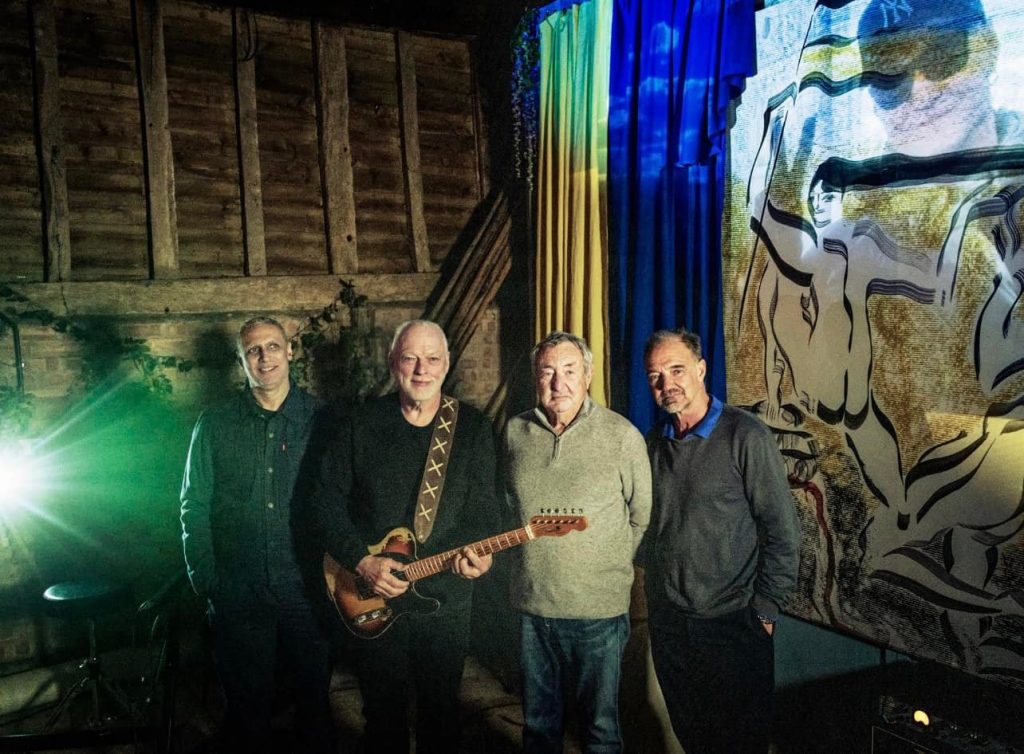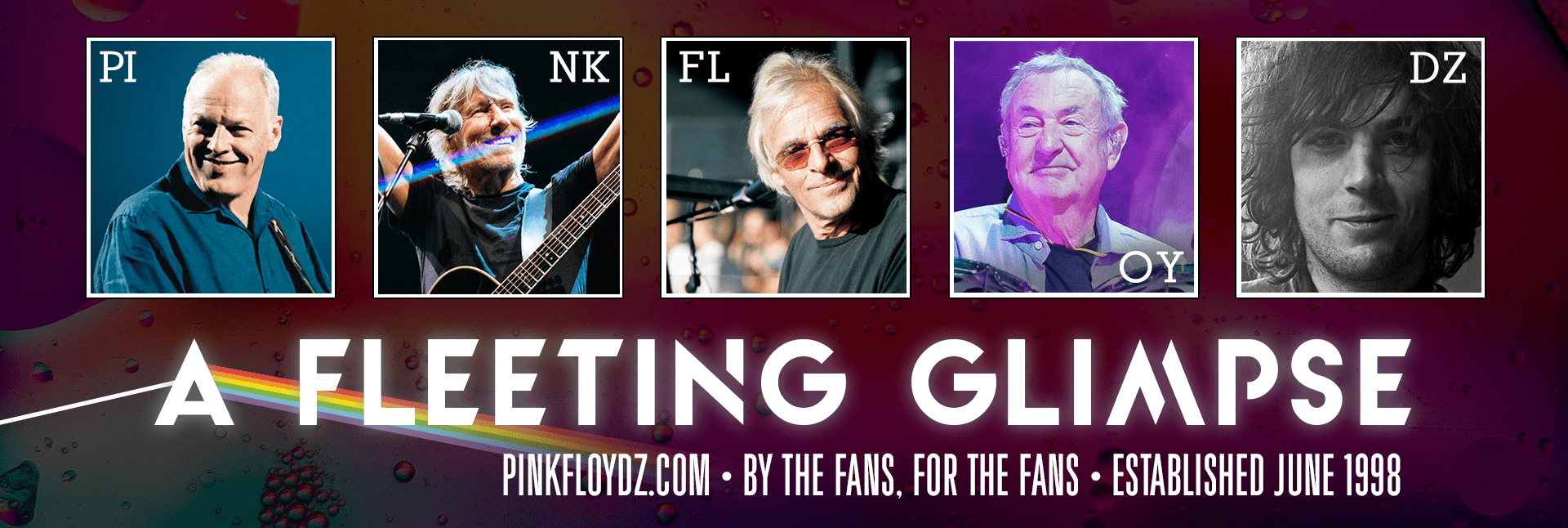David Gilmour Interview With Rolling Stone
The courage of the people of Ukraine inspired Gilmour and drummer Nick Mason to release their first new song as Pink Floyd since 1994: “We want to spread this message of peace, and we want to raise the morale of the people who are defending their homeland”

A few days after Russia invaded Ukraine, singer-turned-soldier Andriy Khlyvnyuk posted video of himself belting “The Red Viburnum in the Meadow” — a folk song about the country’s strength in the face of adversity — to Instagram. The vocalist, who fronts the Kyiv group Boombox, had hoped to be playing gigs in the U.S. last month. But when he heard Russia had invaded his homeland, he returned to defend it. At the outbreak of the war, he told Rolling Stone he felt it was his duty to stick up for Ukraine for the sake of the world. “[The West] needs us as the shield to protect it all,” he said.
In the video, he’s wearing fatigues and clinging to a submachine gun as he serenades the empty streets: “Our glorious Ukraine shall hey, hey, rise up and rejoice.”
Pink Floyd’s David Gilmour watched the clip with awe. “My daughter-in-law, who actually is Ukrainian, sent it to me and I thought, ‘Wow, that’s fantastic,‘” Gilmour tells Rolling Stone. “It just struck me that here we are, with our name [Pink Floyd] and this platform, and we could use it more. That piece of singing immediately got me thinking of turning it into something.” So he sequestered himself in his studio, figured out the chords that would support Khlyvnyuk’s powerful vocals, and wrote what became “Hey, Hey, Rise Up” — the first new Pink Floyd recording in nearly 30 years.
“I thought this could be something that we use our platform for, for enormous good,” Gilmour says. So I called [Pink Floyd drummer] Nick [Mason] up and said, ‘Did you want to be a part of it?’ And he said, ‘Yes, great.‘” Last week, the pair, along with bassist Guy Pratt and keyboardist Nitin Sawhney, recorded the song, which sticks to the traditional melodies of the folk song (notwithstanding a few emotive guitar solos) at Gilmour’s home studio with a projection of Khlyvnyuk’s original video. It was the first time Gilmour and Mason had recorded a new Pink Floyd song since the sessions for 1994’s The Division Bell.
Gilmour had closed the book on Pink Floyd after 2014’s The Endless River, which he and Mason had built from recordings made during the Division Bell sessions. But with “Hey, Hey, Rise Up,” he changed his mind. Pink Floyd rushed to release the song quickly to raise awareness for the civilians suffering in Ukraine and to raise money for humanitarian relief in the country.
“I hope the song does some good,” Gilmour tells Rolling Stone, explaining why he decided to resurrect Pink Floyd. “I hope we achieve something with it.”
What was it about Andriy’s video that inspired you to write a new Pink Floyd song?
It’s just very moving when you see Andriy standing in the square in Kyiv, in the midst of all this turmoil, and just opening his voice up for the hell of it and singing that rousing Ukrainian song to no one and to nothing.
Why was it important to release the song as Pink Floyd and not one of your own recordings?
Well, obviously, the following that we have as Pink Floyd — the size of the platform. When I spoke to Nick, and he said he was willing to do it as Pink Floyd, it seemed like a no-brainer. We want to spread this message of peace, and we want to raise the morale of the people who are defending their homeland there in Ukraine. So why not?
How familiar were you with Andriy’s music previously?
In 2015, I was asked to be a part of a benefit concert to support the Belarus Free Theatre. [The members of the theatre] are constantly harassed, imprisoned, and very badly treated in their homeland of Belarus, so we were helping to raise awareness and money for them. Boombox were on the same show. Unfortunately, Andriy couldn’t get there because his visa went wrong at the last moment, but [Boombox] were my backing band for the concerts and we played four songs together. They were really good musicians. So when I read recently about Andriy leaving his tour, going back to Ukraine to fight for his homeland, it was an inspiring and chilling thing. He’s a brave man.
How did Andriy react when you told him you wanted to record his song?
He sounded thrilled. I managed to get his number and I gave him a ring, and I think he was maybe a little suspicious of whether I was genuine or not. He said, “Could we do this on a FaceTime video call?” So I said, “Sure.” When he recognized me and he was assured that it was all for real, from then on, he was great. He loved the track, and I’m just thrilled for him and for us for taking a little step for humanity in the midst of all the inhumanity that’s been going on there.
The recording session was just a week ago. How quickly did this come together?
I literally started thinking about it just over two weeks ago, and here we are now.
How did it feel to be recording with Nick Mason again?
Well, it’s fantastic. Nick is like no other drummer. It’s a wonderful thing for us to be together playing a song that means something fantastic.
“Hey, Hey, Rise Up” begins with a choir. Who is singing?
From the first moment of seeing Andriy singing in the square in Kyiv, I was looking at other videos; you look at one and it suggests another. One that came up was a Ukrainian folk choir called Veryovka. They were singing a different version of [“The Red Viburnum in the Meadow”] in the video I watched. That beautiful part is how they open the song up. I just thought I would put that on in the beginning to see how it sounded, and it sounded great. So we got in touch with them and got their permission to use it.
How did you conceptualize the song’s arrangement?
Well, first of all, you have to figure out what the chords are that he is hearing in his head when he’s singing it. There’s a certain amount of guesswork and then a certain amount of checking against other versions. I worked out the chords for the vocal part of it, and I played those through a few times. I took his voice and put it into my recorder and played it back in time with a click track and then played along with it on my guitar. When the vocal finished, I just kept going and let my guitar lead me into some new guitar chords and parts for the rest of the song. [Those chords] sounded like they could be part of the same song but that part of a new sequence. I think it fits pretty well with the topic and the other music.
Did you improvise the guitar solos?
I suppose what I do a lot is improvise and then fix. If I make mistakes — which I make a lot of — we go in and figure out a new bit for that part. Usually the best part of it is the stuff that comes straight off the top of your head.
The chords that I was using for the solos led themselves out of the music that Andriy is singing over, so what I’m playing over is inspired by that. So you could say there’s a fairly direct and improvised influence of Ukraine and what I’m thinking of, but when I’m playing, I’m not thinking of anything. I’m going to let my mind be devoid of everything and just let it steer itself.
Are you considering more Pink Floyd music? How did this fit into the rest of the music you’re working on?
This is a one-off for Pink Floyd. I’m casually working away all the time. I’m hoping to get an album finished at some point, but my focus at this very moment is just on this.
You have been outspoken against Russia’s invasion of Ukraine from the beginning. How has the war touched your life personally?
Any war, but particularly a war that is started by a world superpower against an independent democratic nation, has got to raise enormous anger and frustration in one. As I said before, I have a small connection there; my daughter-in-law is from Ukraine. And the band Boombox are Ukrainian people that I already knew — not well, but from some time ago. It’s an enormously difficult, frustrating, and anger-making thing that one human being could have the power to go into another independent democratic nation and set about killing the population. It’s just obscene to an extent that is just beyond my belief.
I felt the frustration of not being able to do anything. And Andriy coming along with this piece of vocal helped to free me from that to some extent that I could actually put my abilities and reputation towards doing something concrete for that particular nation at this particular moment. This is the story of the moment, and you want to keep that story alive and do as much as you can to boost the morale of the people involved with it. You want to keep it in the news and keep people’s consciences active on the topic.
In March, you pulled your music and some of Pink Floyd’s music from streaming services in Russia and Belarus. How did you decide to do that? I noticed it wasn’t all of Pink Floyd’s music.
The last thing I want to do is to rob the actual population because Russia is not full of terrible people. It’s just that their leadership has gone so horribly wrong. But the fact is that that is the way the sanctions thing works. I feel that if we did something like that, it might help to make people within Russia think more about what was going on and try to get them to agitate more for change in their country.
I got Nick’s approval and shortly afterwards the Syd Barrett family estate’s approval and we took down everything we could.
How did you feel about the reaction you got from removing the music?
Well, if you want to go troll-chasing, there’s a lot of it about. I tend to avoid it, but I’ve had a lot of favorable and enthusiastic and grateful comments about it from all over. People in Ukraine are grateful if that people are doing something and trying to stand up for them and show solidarity with what the hell they’re going through.
How else would you like to see the rest of the world reacting to Russia’s invasion?
A lot of the world is reacting in the right way. They are angry and they are frustrated. You can see and hear the frustration in the leaders of the other world’s countries. We can see it in the voice of your president, President Biden. He has let slip a couple of his feelings a couple of times over there. Other world leaders have done the same. And I think there’s a groundswell of opinion worldwide. This sort of thing shouldn’t be able to happen. It shouldn’t be able to be allowed. But we are in a world where still, here we are, a fifth of the way through the 21st century and still this obscene situation can happen. The mind boggles. It’s beyond my comprehension.
